新概念1练习(现在完成时、过去完成时)
新概念一册过去时态和现在完成时测试2
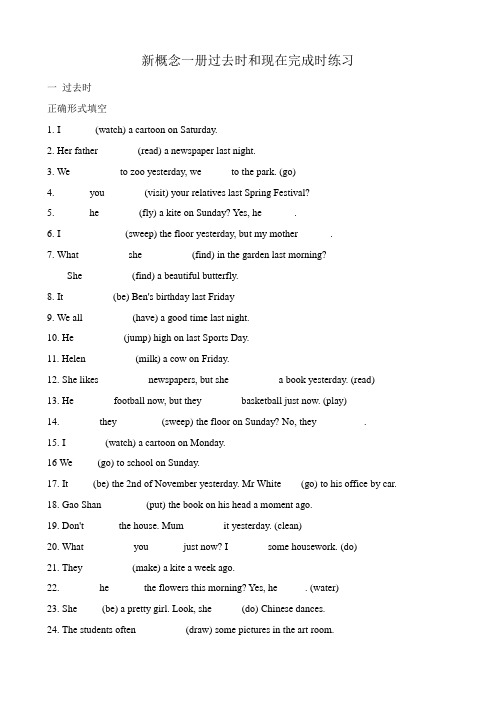
新概念一册过去时和现在完成时练习一过去时正确形式填空1. I ______ (watch) a cartoon on Saturday.2. Her father _______ (read) a newspaper last night.3. We _________ to zoo yesterday, we _____ to the park. (go)4. ______ you _______ (visit) your relatives last Spring Festival?5. ______ he _______ (fly) a kite on Sunday? Yes, he ______.6. I ____________ (sweep) the floor yesterday, but my mother ______.7. What _________ she _________ (find) in the garden last morning?She _________ (find) a beautiful butterfly.8. It _________ (be) Ben's birthday last Friday9. We all _________ (have) a good time last night.10. He _________ (jump) high on last Sports Day.11. Helen _________ (milk) a cow on Friday.12. She likes _________ newspapers, but she _________ a book yesterday. (read)13. He _______ football now, but they _______ basketball just now. (play)14. _______ they ________ (sweep) the floor on Sunday? No, they _________.15. I _______ (watch) a cartoon on Monday.16 We ____ (go) to school on Sunday.17. It ____ (be) the 2nd of November yesterday. Mr White ___ (go) to his office by car.18. Gao Shan ________ (put) the book on his head a moment ago.19. Don't ______ the house. Mum _______ it yesterday. (clean)20. What _________ you ______ just now? I _______ some housework. (do)21. They _________ (make) a kite a week ago.22. _______ he ______ the flowers this morning? Yes, he _____. (water)23. She ____ (be) a pretty girl. Look, she _____ (do) Chinese dances.24. The students often _________ (draw) some pictures in the art room.二.现在完成时1.She _____ already______(do) her homework.2.I ________just________(have) lunch.3.______she just_______(water) the flower?4.We_______already_______(be) to Beijing.5.They_______already_______(meet) their father.6.She_______ already________(get) some books.7.________you just________(do) the housework?8.Tom________already______(tell) me the truth.9.Your mother ______already______(hear) the news.10.My friend ______just______(find) his pen.三.过去时和现在完成时1. “_______ you ________ (have) lunch ?” “Yes.”“When _______ you _______ (have) it?” “I _____ (have) it at 12:00.”2. Your father _____ just _______ (finish) his work.3. Your father ________ (finish) his work just now.4. Last term I ______ (learn) many English words.5. He ______ never _________ (go) to the science museum.6. ______ you ever ________ (drink) coke?7. “______ you ______ (buy) a dictionary? “ “Yes, I _______ .”“Where __________ you _____________ (buy) it?” “ I ___________ (buy) it in a bookstore.”“When _________ you _______ (buy) it?” “ Yesterday.”。
最新新概念1练习(现在完成时、过去完成时)
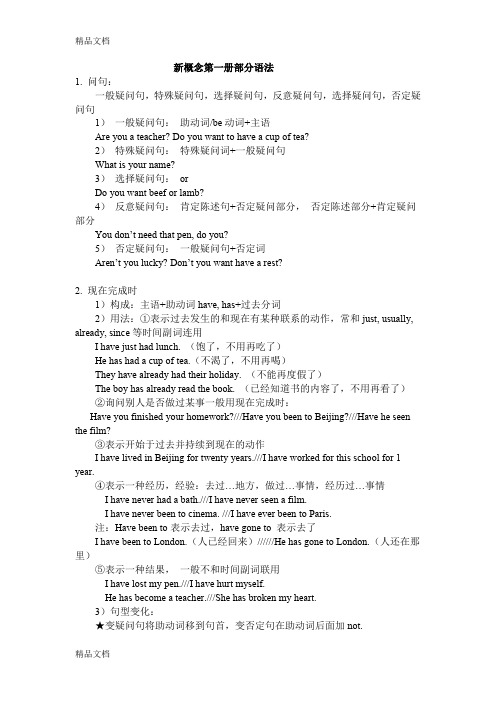
新概念第一册部分语法1. 问句:一般疑问句,特殊疑问句,选择疑问句,反意疑问句,选择疑问句,否定疑问句1)一般疑问句:助动词/be动词+主语Are you a teacher? Do you want to have a cup of tea?2)特殊疑问句:特殊疑问词+一般疑问句What is your name?3)选择疑问句:orDo you want beef or lamb?4)反意疑问句:肯定陈述句+否定疑问部分,否定陈述部分+肯定疑问部分You don’t need that pen, do you?5)否定疑问句:一般疑问句+否定词Aren’t you lucky? Don’t you want have a rest?2. 现在完成时1)构成:主语+助动词have, has+过去分词2)用法:①表示过去发生的和现在有某种联系的动作,常和just, usually, already, since等时间副词连用I have just had lunch. (饱了,不用再吃了)He has had a cup of tea.(不渴了,不用再喝)They have already had their holiday. (不能再度假了)The boy has already read the book. (已经知道书的内容了,不用再看了)②询问别人是否做过某事一般用现在完成时:Have you finished your homework?///Have you been to Beijing?///Have he seen the film?③表示开始于过去并持续到现在的动作I have lived in Beijing for twenty years.///I have worked for this school for 1 year.④表示一种经历,经验:去过…地方,做过…事情,经历过…事情I have never had a bath.///I have never seen a film.I have never been to cinema. ///I have ever been to Paris.注:Have been to表示去过,have gone to 表示去了I have been to London.(人已经回来)//////He has gone to London.(人还在那里)⑤表示一种结果,一般不和时间副词联用I have lost my pen.///I have hurt myself.He has become a teacher.///She has broken my heart.3)句型变化:★变疑问句将助动词移到句首,变否定句在助动词后面加not.e.g. Have you lost your pen? I have not lost my pen.★肯定回答及否定回答:Yes, I have. No, I have not.★特殊疑问句:What have you done? /// What has he done?一般过去时与现在完成时的区别:凡是有明确的表示过去的时间状语的句子为过去时3. 过去完成时:1)用法:在过去的时间里,两个动作中,发生在前的哪个动作要用过去完成时。
新概念英语第一册语法专项练习卷--时态复习
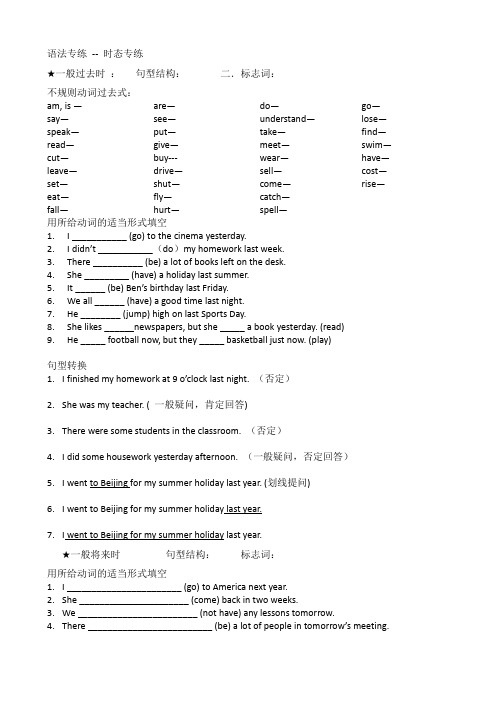
语法专练-- 时态专练★一般过去时:句型结构:二.标志词:不规则动词过去式:am, is — are— do— go— say— see— understand— lose— speak— put— take— find— read— give— meet— swim— cut— buy--- wear— have— leave— drive— sell— cost— set— shut— come— rise— eat— fly— catch—fall— hurt— spell—用所给动词的适当形式填空1.I ___________ (go) to the cinema yesterday.2.I didn’t ___________(do)my homework last week.3.There __________ (be) a lot of books left on the desk.4.She _________ (have) a holiday last summer.5.It ______ (be) Ben’s birthday last Friday.6.We all ______ (have) a good time last night.7.He ________ (jump) high on last Sports Day.8.She likes ______newspapers, but she _____ a book yesterday. (read)9.He _____ football now, but they _____ basketball just now. (play)句型转换1.I finished my homework at 9 o’clock last night. (否定)2.She was my teacher. ( 一般疑问,肯定回答)3.There were some students in the classroom. (否定)4.I did some housework yesterday afternoon. (一般疑问,否定回答)5.I went to Beijing for my summer holiday last year. (划线提问)6.I went to Beijing for my summer holiday last year.7.I went to Beijing for my summer holiday last year.★一般将来时句型结构:标志词:用所给动词的适当形式填空1.I _______________________ (go) to America next year.2.She ______________________ (come) back in two weeks.3.We ________________________ (not have) any lessons tomorrow.4.There _________________________ (be) a lot of people in tomorrow’s meeting.句型转换1.I will clean the windows tomorrow. (否定,一般疑问,肯定回答)2.She will have a holiday next month.(同上)★现在完成时句型结构:标志词:不规则动词过去分词:am, is — are— do— go— say— see— understand— lose— speak— put— take— find— read— give— meet— swim— cut— buy--- wear— have— leave— drive— sell— cost— set— shut— come— rise— eat— fly— catch—fall— hurt— spell—★用所给动词的适当形式填空1. I ______________________ (live) here for 20 years.2. I _______________________ (not see) him since 1997.3. I _______________________ (eat) hamburgers since I left Beijing.4. He __________ never ______________ (go) to Beijing.5. We ____________ already _____________ (finish) our homework.6. She is the best student I ____________ ever ____________ (see).7. I ___________________ (be) to Shanghai three times.句型转换1. I have already done all the homework. (否定句,一般疑问句,肯定回答)2. She has got a sister. (否定句,一般疑问句,否定回答)★综合练习用所给动词的适当形式填空1.He can _________ (have) dinner in a restaurant this evening.2.--What did he do yesterday? He ____ (stay) at home with his brother.3.She ____________ (talk) to her mother just now.4.I ____________ already _____________ (finish) my homework.5.She _____________ (tell) her mother the truth last night.6.He _______________ (be) a father since last year.7.--- What was the weather like yesterday? --- It _________ (rain).8.I _____________ (type) the letter last week.9.You must _______________ (send) the letter to the boss.10.I ________________ (go) to school tomorrow morning.11.She _____________ (come) to the party tomorrow night.12.It ____________ (rain) last night.13. You’d better __________________ (not catch) the 7:00 flight.14. He says that his friends ___________ (visit) him next week.15. They ___________ just _____________ (clean) the room.★宾语从句完成下列宾语从句1.李明说他喜欢玩电脑游戏。
新概念一册测试题答案
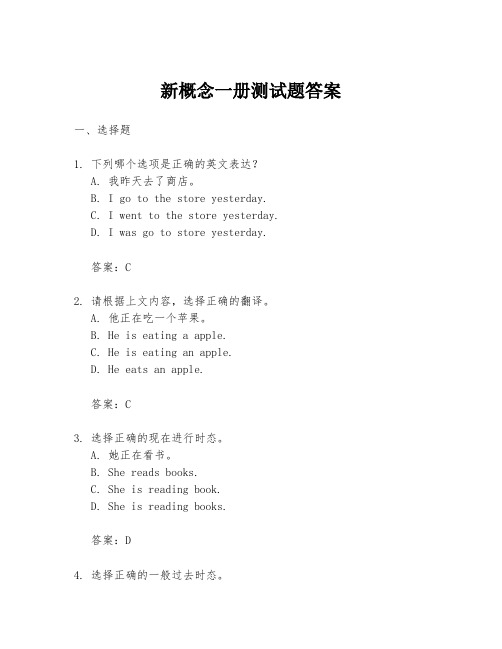
新概念一册测试题答案一、选择题1. 下列哪个选项是正确的英文表达?A. 我昨天去了商店。
B. I go to the store yesterday.C. I went to the store yesterday.D. I was go to store yesterday.答案:C2. 请根据上文内容,选择正确的翻译。
A. 他正在吃一个苹果。
B. He is eating a apple.C. He is eating an apple.D. He eats an apple.答案:C3. 选择正确的现在进行时态。
A. 她正在看书。
B. She reads books.C. She is reading book.D. She is reading books.答案:D4. 选择正确的一般过去时态。
A. 他们昨天去了公园。
B. They go to the park yesterday.C. They went to the park yesterday.D. They are going to the park yesterday.答案:C5. 选择正确的一般将来时态。
A. 我明天将会去图书馆。
B. I will go to the library tomorrow.C. I will goes to the library tomorrow.D. I will go to library tomorrow.答案:B二、填空题1. 请将下列句子翻译成英文并填空。
他每天骑自行车上班。
He ________ to work every day.答案:rides a bike2. 根据中文提示,完成句子。
我昨天在书店买了一本书。
I bought a book ________.答案:in the bookstore yesterday3. 请用正确的介词填空。
她喜欢在周末和她的朋友们一起看电影。
新概念第一册91课现在完成时专项练习
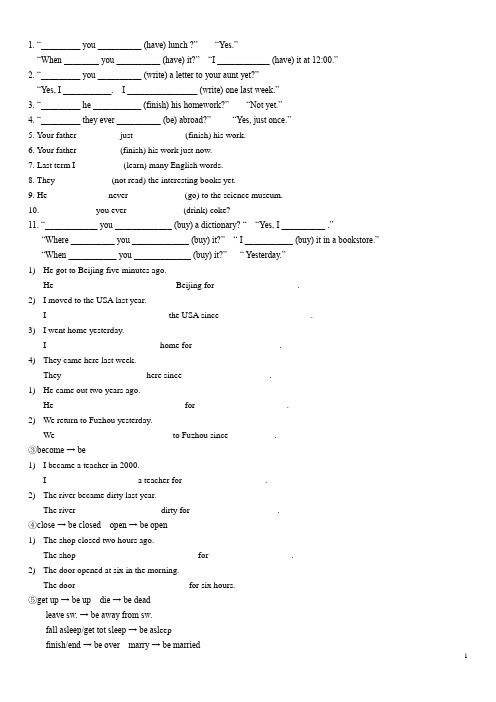
1. “_________ you __________ (have) lunch ?” “Yes.”“When ________ you __________ (have) it?” “I ____________ (have) it at 12:00.”2. “_________ you __________ (write) a letter to your aunt yet?”“Yes, I ___________. I ________________ (write) one last week.”3. “_________ he ___________ (finish) his homework?” “Not yet.”4. “_________ they ever __________ (be) abroad?” “Yes, just once.”5. Your father _________ just ___________ (finish) his work.6. Your father _________ (finish) his work just now.7. Last term I __________ (learn) many English words.8. They ____________ (not read) the interesting books yet.9. He _____________ never ____________ (go) to the science museum.10. ____________ you ever ____________ (drink) coke?11. “____________ you _____________ (buy) a dictionary? “ “Yes, I __________ .”“Where __________ you _____________ (buy) it?” “ I ___________ (buy) it in a bookstore.”“When ___________ you _____________ (buy) it?” “ Yesterday.”1)He got to Beijing five minutes ago.He ________ _________ _________ Beijing for _________ _________.2)I moved to the USA last year.I ________ ________ __________ the USA since __________ __________.3)I went home yesterday.I _______ ________ _________ home for _________ __________.4)They came here last week.They _________ _________ here since _________ __________.1)He came out two years ago.He _________ __________ _________ for __________ __________.2)We return to Fuzhou yesterday.We ________ ________ _________ to Fuzhou since __________.③become → be1)I became a teacher in 2000.I ________ __________ a teacher for _________ _________.2)The river became dirty last year.The river _________ _________ dirty for _________ __________.④close → be closed open → be open1)The shop closed two hours ago.The shop ________ _________ _________ for _________ _________.2)The door opened at six in the morning.The door ________ ________ ________ for six hours.⑤get up → be up die → be deadleave sw. → be away from sw.fall asleep/get tot sleep → be asl eepfinish/end → be over marry → be married1)I got up two hours ago.I ________ ________ ________ since ________ ________.2)He left Fuzhou just now.He _______ ________ ________ _________ Fuzhou for five minutes.3)My grandpa died in 2002.My grandpa _______ _______ ________for _______ ________.4)The meeting finished at six.The meeting ________ ______ ______ for six hours.5)I got to sleep two hours ago.I ________ _________ _________ since _________ __________.6)They married in 1990.They ________ _________ __________since _________.⑥start/begin to do sth. → do sth.begin → be on1)I began to teach at this school in 1995.I ____ ____ at this school since ____.2)The film began two minutes ago.The film ____ ____ ____ for ____ ____.⑦borrow → keep lose → not have buy → have put on → wear catch/get a cold → have a cold get to know → know1)They borrowed it last week.They _________ _________ it since __________ __________.2)I bought a pen two hours ago.I _________ _________ a pen for ________ __________.3)I got to know him last year.I _________ __________ him since __________ __________.4)I put on my glasses three years ago.I __________ __________ my glasses for _________ _________.⑧have/has gone to → have been in1)He has gone to Beijing.He ____ ____ _____ Beijing for two days.⑨join the league/the Party/the army→ be a league/a Party member/a soldier→ be a member of the league/the Party→ be in the league/the Party/the army1)He joined the league in 2002.He ________ _________ a _________ _________ for two years.He ________ __________ a __________ ___________ the __________ for two years.He ____________ ___________ ___________ the league for two years.2)My brother joined the army two years ago.My brother __________ __________ a ___________ for ___________ ___________.My brother ___________ ___________ in ____________ ___________ for two years.4.划线提问1) I have been there for two days.__________ _________ __________ you __________ __________ ?2)My father has lived here since 2000._________ _________ __________ your father _________ __________? 3)He left here yesterday._________ ________ he _________ __________?4)They bought a book two hours ago.__________ ___________ they __________ a book?I. 用have(has) been 或have(has) gone 填空。
(完整word版)新概念一时态及练习题

五种时态讲解及练习题英语的时态(tense )是一种动词形式,不同的时态用以表示不同的时间与方式。
下面就英语中常见的八种基本时态进行阐述,其它的时态都是在这八种时态的基础上结合而成的。
一、一般现在时:1. 概念:经常、反复发生的动作或行为及现在的某种状况。
2. 时间状语:always, usually, often, sometimes, every week (day, year, month...), once a week, on Sundays,3. 基本结构:动词原形(如主语为第三人称单数,动词上要加(e )S )4. 否定形式:am/is/are+not;此时态的谓语动词若为行为动词,则在其前加don 't, 如主语为第三人称单数,则用doesn 't ,通常还原行为动词。
5. 一般疑问句:把be 动词放于句首;用助动词do 提问,如主语为第三人称单数,则用doe s ,同时,还原行为动词。
6. 例句:It seldom snows here.He is always ready to help others.Action speaks louder than words.1.I like ____________ (swim).2.He _________(read) English every day.3.We _________(go)to school at seven in the morning.4.Mike________(go)to school at seven in the morning.5.My mother________(like) ______(go) shopping.6.I can ________(draw) many beautiful pictures.7.She_________(make) a model plane.8.Do you ________(like)_________(run)?9.Does he_________(like)_________(jump) ?10.Does Nancy_________(grow)flowers on Saturday ?11.The teachers________(like)___________(dance).12.The teacher________(like)____________(dance).2)用所给的人称改写句子1.I take photos on Sunday. ( Mike)2.We grow beautiful flowers. (she)3.They like collecting stamps. (Ben)4.I listen to music carefully. (my aunt)5.You like making a model ship. (Helen二、一般过去时:1. 概念:过去某个时间里发生的动作或状态;过去习惯性、经常性的动作、行为。
新概念英语第一册时态总结+练习
新概念第一册八大时态总结一.一般现在时1.结构基本结构否定句一般疑问句be动词am/is/are+not be提前,放于句首实义动词don’t/doesn’t+do(动词原形)Do/Does+主语+do(动词原形)…?2.用法1)表示经常的、习惯性的动作或存在的状态,常与表示频度的副词连用。
常用的频度副词有:always、often、usually、seldom、never、sometimes, every week (day, year, month…), once a week, on Sundays.频度副词在句中通常放在行为动词之前,系动词、助动词之后。
2)表示主语具备的性格、特征和能力等。
All my friends love football .3)表示客观真理、客观存在、自然现象。
The earth moves around the sun.4)if 引导的条件状语从句主将从现I'll tell him the news if he comes back.二.一般过去时态1.结构基本结构否定句一般疑问句be动词was/were+not was/were提前,放于句首实义动词didn’t+do(动词原形)Did+主语+do(动词原形)…?2.用法表示过去某一时刻或某一段时间里所发生的动作或情况。
常和表示过去的时间状语yesterday, just now, the other day(几天前), in 1982, ago, an hour ago, long long ago, the day before yesterday, last week(year, night, month…), at the age of 5, one day, once upon a time等连用三.一般将来时1.结构一、句型结构:1.be going to 主语+(am/is/are)going to +动词原形2.will :主语+will+动词原形(will为助动词,与情态动词用法相同,与动词原形构成谓语,不需要根据人称进行变化。
新概念英语第一册语法及专项练习
新概念英语第一册语法点归纳新概念一共144课,其中单课为课文,双课为语法和练习。
整本书是以单数课为正课,并附带有插图而双数课则是针对单数课所讲的内容有针对性地进行练习,从此出展现出整个新概念一教材区别于其他教材的独特之处。
以下是对新概念一整本教材的理解和剖析,以供各位对整个课本的理解和把握上参考和借鉴。
首先根据课本中出现的时态来分析:本册书的语法出现层次性和规律性是很强的,首先我们先来整本书中都出了哪些时态,这些时态的具体分布和讲解时我们大家需要注意的递进性。
Lesson 31—34 现在进行时Lesson 37—40 第一次出现be going to 的将来时Lesson 51—56 一般现在时Lesson 67—76 为一般过去式Lesson 83—90 为现在完成时Lesson 91—96 为一般将来时(will)Lesson 117—118 过去进行时Lesson 119—120 过去完成时除去前面所有时态和句型所占据的76课我们一起来看一下以下的68课,每一课小的语言点,语法点都是在什么地方,应该用什么样的方式来讲解。
在这里告诉学员新概念一的每一个单课的重点都是出现双课的标题和课后的练习题里面。
Lesson1—2语言点:与陌生人说话或引起别人的注意。
Excuse me. Yes? Pardon? Thank you very much.语法点:主系表结构this为主语,名词做表语1的一般疑问句以及它的肯定回答。
Is this your handbag? Yes, it is.Lesson 5—6语言点:如何介绍别人。
This is Miss Sophie Dupont. Nice to meet you.语法点:主语为第三人称单数的主系表结构。
She is French. He is German. It’s a Volvo.(L6)a/an 的使用。
Lesson 7—8语言点:如何自我介绍和相互认识。
新概念1练习(现在完成时、过去完成时)
新概念1练习(现在完成时、过去完成时)练习题现在完成时练习一、按要求改变句型1. He has heard that before. (改为否定句)2. The retired people have climbed Mount Xiang many times. (改为否定句)3. David has already booked the theatre. (改为否定句)4. Steve and Carol have gone to Italy. (改为否定句)5. I have had lunch already. (改为疑问句)6. Two of the scientists have been to the North Pole. (改为疑问句)7. I have taught English in the middle school since 1980. (改为疑问句)8. They have found a job already. (改为疑问句)9. The Smiths have had a holiday since Christmas. (对划线部分提问)10. The famous singers have gone to Greece to have a meeting. (对划线部分提问)11. Li Ming has received the invitation already. (对划线部分提问)12. Jim has forgotten how to play cards. (对划线部分提问)二用括号中动词的适当形式填空1. Every student ________ (see) the program already.2. Kent and I ________ (write) poems before.3. Dick ________ (do) the work these days.4. The people living in the mountains ________ never ________ (see) films.5. Patty ________ (buy) a magazine about the school life.6. The actress ________ (live) here all her life.7. The glass is broken. Who ________ (break) this glass?8. Finally the workers ________ (finish) that job.9. ________ you ________ (borrow) the book we talked abut last time?10. There’s no more wine in the bott le. They ________ (drink) all of it.11. Tom ________ (leave) a message for you. He ________ (call) last night.12. I ________ (see) the movie once before. I ________ (love) it a lot.13. A: ________ (you/hear) the news?B: yes, I ________A: Who ________ (tell) you the news?B: Li Ming ________ (do)A: When ________ (he/tell) you?B: Two hours ago.三. 改错1. What have you done last night?2. He knew Doctor Wang since thirty years ago.3. Kite has hurt his leg, but it’s OK now.4. I work here for over ten years.5. The chairman has gone to many countries in his life.6. Where have you borrowed that dictionary?7. I’ve seen the play already. Have you seen it already?8. Did you see your sister carries all the baggage to the station?9. My brother has bought a used car, but then he sold it.10. Her mother has gone to Europe last season.四、选择填空( )1.——Have you _____ travelled on the train?——Yes, I have.(A) never (B)ever (C)just (D)yet( ) 2.——Have you finished your homework ——Not . (A) ever(B)already (C)yet (D)just( ) 3. We haven’t finished our homework _____.(A) already (B)ever (C)yet (D)never( ) 4.——Have you learned English?——Yes, I've _____ learned a lot.(A) never, ever (B)ever, never (C)ever, already (D)already. ever( ) 5.——Have you finished your homework _____?——Yes, I’ve done that _____.(A) yet, already (B)already, yet (C)ever, never (D)still, just( ) 6.John’s father _____ borrowed some pictures(A)have already (B)has just (C)have ever (D)has yet( ) 7.He finished his homework yet(A) doesn’t(B)haven’t(C) hasn’t (D) doesn’t have( ) 8.I has been like this ever since _____.(A) last week (B) for a week (C) a week before (D)the last week( ) 9.My mother has worked in this factory _____ 2 years.(A) about (B)for (C)in (D)since( ) 10. I haven't heard from him last week.(A) since (B) for (C)ago (D)before( ) 11.His father joined the party_________(A) for three years (B)since three years ago(C) three years ago (D) in two years' time( ) 12.Mr Green isn't in the office. He _____ to the library.(A)has gone (B)went (C)has been (D)will go( ) 13.Mr Smith _____ to T okyo and he will be back in a week(A) has been (B)has visited (C)has sent (D)has gone ( ) 14. They _____ China for two years.(A) have been to (B)have been in(c) have gone to (D)have come to( ) 15. Jim's been to the Great wall before, _____?(A)isn't (B)wasn't (C)hasn't (D)doesn't( ) 16.She’s never been to England, _____ she?(A) has (B)hasn't (C)isn't (D)is( ) 17.___________has Hanmei been in the library.(A)How long (B)How soon (C)How far (D)How often( ) 18.How long ___ he ___ the library book?(A) has, borrow (B)has, kept (C)has, bought (D)did, buy( ) 19.Her father _____ in 1990 and her husband _____ for more than five years.(A) died ,dead (B)has died, dead (C)died ,has been dead (D)has died, has died ( ) 20.I have _____ this nice watch for two years.(A) had (B)bought (C)borrowed (D)lend( ) 21.He _____ his home for ten years.(A)has left (B)left from (C)has been away from (D)was away from ( ) 22.He _____ a league member for three years.(A) is (B)has been (C)has become (D)have become( ) 23.Lihua’s brother has _____ for two years.(A) joined the army (B)been an army (C)become a soldier (D)been in the army ( ) 24.He hasn’t _____ Guangzhou ever since he left school.(A) left (B)been away from (C)been in (D)away from( ) 25. ——Have you finished your homework? ——Yes, I _____ it last night. (A) finish (B)finished (C)have finished(D)will finish ( ) 26.—— _____ you ever _____ to Nanjing? —Yes, I _____ there last year. (A)Have…gone, have gone (B) Have…been, went(C)Did…go, went (D)Did…go, has , been( ) 27.——When _____ you _____ Lucy in New York?——I _____ here for two years.(A) did…meet, has n’t seen (B)did…meet, h aven't seen(C) did…meet, don't see (D)would…meet, hadn't seen过去完成时专项练习1. By the time my parents reached home yesterday, I _____ the dinner already.A had cooked B. cooked C. have cooked D. was cooked2. She said she __________ the principle alreadyA .has seen B. saw C. will see D. had seen3. She said her family _______ themselves ______ the army during the war.A. has hidden, fromB. had hidden, fromC. has hidden, withD. had hidden, with4. By the time he was ten years old, he _________.A. has completed universityB. has completed the universityB. had completed an university D. had completed university5. He _____ to play ____ before he was 11 years old.A had learned, piano B. had learned, the pianoC. has learned, the pianoD. learns ,piano.6 .He ___ in the factory for three years before he joined the Army.A. has workedB. worksC. had workedD. will work7. By the end of last week, they ____ the bridge.A. has completedB. completedC. will completeD. had completed8. By the time he was 4, he ______ a lot of German words.A. had learnedB. has learnedC. learnedD. learns9. The students _________ their classroom when the visitors arrived.A . have cleaned B. had cleaned C. was cleaned D. have been cleaned10. My mother______ in that factory at the age of 18.A. had workedB. has workedC. workedD. works2.用动词的适当形式填空1. Tom __________ (say) he ___________ (read) the book twice.2. He said he _____________already_________(give) the book to the teacher.3.句型转换1.I had sold the ticket when she came.(改否定句)2. She had sung a song to us before she danced.(改否定句)3..By 10:00 a.m, I had been very hungry. (改一般疑问)4. Lucy had already completed the project when I arrived.(改一般疑问)5. We had our tests. Then we had a long holiday.( 用过去完成时连接两句)After we ________________________, we _____________________________6. He showed us a picture. Then he showed us around the house. 用过去完成时连接两句) Before he _______________________, he______________________________.。
最新新概念1册现在完成时考试题
现在完成时态测试题一、写出下列动词的过去式和过去分词study _______ _______ eat _______ _______ pay _______ _______ chat _______ _______ lose _______ _______ come _______ ________read _______ _______ stop _______ _______ run _______ _______ fall _______ _______ see _______ _______ fall_______ _______ swim _______ _______ give _______ _______take _______ _______ know _______ _______ think _______ _______ leave _______ _______write_______ _______choose _______ _______ get _______ _______ begin _______ _______be __________ ________ bring _______ _______ catch _______ _______ find _______ _______ go _______ _______ hold _______ _______ hear______ ______ lay ______ ______ hurt _____ ______ learn ______ ______二、按要求完成句子1. It (rain)for a week.2. I don’t know this woman. I (meet, never)her.3.-Let’s go to the cinema.-No, I (see, already)the film.4. We (finish, not)our homework yet. Will you wait a minute?5. John (come, not)yet. He will be back in a minute.6. Mr. Green often goes to America. In fact, he (be)there ten times.7. -Where’s John? -He just (go)to the teachers’ office.8. She (study)English since she was ten.9. Jim isn’t here. He(go)to the library. He (go)there an hour ago.10. I (buy)the bike two weeks ago. I (have)this bike since the beginning of this month.11. Tom can’t get into the room because he (lost)the key to the door.He finished his homework .12. -When you (buy)the book?-I (have)it for two weeks. 13.you ( read) the book yet?14.You (find) your lost book? Yes, I (find) it hours ago.15.You needn’t tell him about it. I already him about it.(tell)16.--when you there?(go) --Three weeks ago.17.--Jim, you (write) a letter to your aunt? --yes, I . I(write) it just now.18.So far, I (not get) a letter from him.19.We already (know) each other before.20.--How many times you ever to Shanghai? --I ever there three times.(去过)三、语法与词汇:从下面四个选项中选出正确答案。
- 1、下载文档前请自行甄别文档内容的完整性,平台不提供额外的编辑、内容补充、找答案等附加服务。
- 2、"仅部分预览"的文档,不可在线预览部分如存在完整性等问题,可反馈申请退款(可完整预览的文档不适用该条件!)。
- 3、如文档侵犯您的权益,请联系客服反馈,我们会尽快为您处理(人工客服工作时间:9:00-18:30)。
新概念第一册部分语法1. 问句:一般疑问句,特殊疑问句,选择疑问句,反意疑问句,选择疑问句,否定疑问句1)一般疑问句:助动词/be动词+主语Are you a teacher? Do you want to have a cup of tea?2)特殊疑问句:特殊疑问词+一般疑问句What is your name?3)选择疑问句:orDo you want beef or lamb?4)反意疑问句:肯定陈述句+否定疑问部分,否定陈述部分+肯定疑问部分You don’t need that pen, do you?5)否定疑问句:一般疑问句+否定词Aren’t you lucky? Don’t you want have a rest?2. 现在完成时1)构成:主语+助动词have, has+过去分词2)用法:①表示过去发生的和现在有某种联系的动作,常和just, usually, already, since等时间副词连用I have just had lunch. (饱了,不用再吃了)He has had a cup of tea.(不渴了,不用再喝)They have already had their holiday. (不能再度假了)The boy has already read the book. (已经知道书的内容了,不用再看了)②询问别人是否做过某事一般用现在完成时:Have you finished your homework?///Have you been to Beijing?///Have he seen the film?③表示开始于过去并持续到现在的动作I have lived in Beijing for twenty years.///I have worked for this school for 1 year.④表示一种经历,经验:去过…地方,做过…事情,经历过…事情I have never had a bath.///I have never seen a film.I have never been to cinema. ///I have ever been to Paris.注:Have been to表示去过,have gone to 表示去了I have been to London.(人已经回来)//////He has gone to London.(人还在那里)⑤表示一种结果,一般不和时间副词联用I have lost my pen.///I have hurt myself.He has become a teacher.///She has broken my heart.3)句型变化:★变疑问句将助动词移到句首,变否定句在助动词后面加not.e.g. Have you lost your pen? I have not lost my pen.★肯定回答及否定回答:Yes, I have. No, I have not.★特殊疑问句:What have you done? /// What has he done?一般过去时与现在完成时的区别:凡是有明确的表示过去的时间状语的句子为过去时3. 过去完成时:1)用法:在过去的时间里,两个动作中,发生在前的哪个动作要用过去完成时。
2)结构:had+过去分词After she had finished her homework, she went shopping.They had sold the car before I asked the price.The train had left before I arrived at the station.After/before引导的时间状语从句放在句首要在句子后面加逗号,如果放在主句后则不用加。
3)句型变化:①变疑问句将助动词移到句首:Had she finished her homework?②变否定句在助动词后面加not:She hadn’t finished her homework.③肯定回答及否定回答:Yes, she had. No, she hadn’t.④特殊疑问句:What had she done?4 情态动词的使用:can, must, may, might, need,1)情态动词can(能够),must(必须),may(可以)结构:主语+can/must/may+动词原型He can make the tea.Sally can air the room.We can speak English.★变疑问句将情态动词移到句首Can he make the tea?Can Sally air the room?Can we speak English?★变否定句在情态动词后面加notHe cannot make the tea.Sally cannot air the room.We cannot speak English.★肯定回答及否定回答Yes, he can. No, he cannot.Yes, she can. No, she cannot.Yes, we can. No, we cannot.★特殊疑问句:What can you do?(必背)注意:情态动词的句子没有第三人称单数的变化,不要在情态动词或动词后面加S。
2)Must/have to的区别must 表示必须,是主观上觉得应该做,have to是不得不,是由于客观条件逼迫的必要要做must 只能用在表示现在和将来的句子里,而have to do可以用在任何时态3)must, may, might表示猜测:· must do 表示对现在事实的猜测·must have done表示对过去事实的猜测·must have been doing 表示对过去正在进行的事实的猜测·may/might do, may/might have done表示没有任何事实依据的猜测,might 的可能性更小。
5·can’t/couldn’t 表示不可能练习题现在完成时练习一、按要求改变句型1. He has heard that before. (改为否定句)2. The retired people have climbed Mount Xiang many times. (改为否定句)3. David has already booked the theatre. (改为否定句)4. Steve and Carol have gone to Italy. (改为否定句)5. I have had lunch already. (改为疑问句)6. Two of the scientists have been to the North Pole. (改为疑问句)7. I have taught English in the middle school since 1980. (改为疑问句)8. They have found a job already. (改为疑问句)9. The Smiths have had a holiday since Christmas. (对划线部分提问)10. The famous singers have gone to Greece to have a meeting. (对划线部分提问)11. Li Ming has received the invitation already. (对划线部分提问)12. Jim has forgotten how to play cards. (对划线部分提问)二、. 用括号中动词的适当形式填空1. Every student ________ (see) the program already.2. Kent and I ________ (write) poems before.3. Dick ________ (do) the work these days.4. The people living in the mountains ________ never ________ (see) films.5. Patty ________ (buy) a magazine about the school life.6. The actress ________ (live) here all her life.7. The glass is broken. Who ________ (break) this glass?8. Finally the workers ________ (finish) that job.9. ________ you ________ (borrow) the book we talked abut last time?10. There’s no more wine in the bottle. They ________ (drink) all of it.11. Tom ________ (leave) a message for you. He ________ (call) last night.12. I ________ (see) the movie once before. I ________ (love) it a lot.13. A: ________ (you/hear) the news?B: yes, I ________A: Who ________ (tell) you the news?B: Li Ming ________ (do)A: When ________ (he/tell) you?B: Two hours ago.三. 改错1. What have you done last night?2. He knew Doctor Wang since thirty years ago.3. Kite has hurt his leg, but it’s OK now.4. I work here for over ten years.5. The chairman has gone to many countries in his life.6. Where have you borrowed that dictionary?7. I’ve seen the play already. Have you seen it already?8. Did you see your sister carries all the baggage to the station?9. My brother has bought a used car, but then he sold it.10. Her mother has gone to Europe last season.四、选择填空( )1.——Have you _____ travelled on the train?——Yes, I have.(A) never (B)ever (C)just (D)yet( ) 2.——Have you finished your homework ——Not .(A) ever (B)already (C)yet (D)just( ) 3. We haven’t finished our homework _____.(A) already (B)ever (C)yet (D)never( ) 4.——Have you learned English?——Yes, I've _____ learned a lot.(A) never, ever (B)ever, never (C)ever, already (D)already. ever( ) 5.——Have you finished your homework _____?——Yes, I’ve done that _____.(A) yet, already (B)already, yet (C)ever, never (D)still, just( ) 6.John’s father _____ borrowed some pictures(A)have already (B)has just (C)have ever (D)has yet( ) 7.He finished his homework yet(A) doesn’t(B)haven’t(C) hasn’t (D) doesn’t have( ) 8.I has been like this ever since _____.(A) last week (B) for a week (C) a week before (D)the last week( ) 9.My mother has worked in this factory _____ 2 years.(A) about (B)for (C)in (D)since( ) 10. I haven't heard from him last week.(A) since (B) for (C)ago (D)before( ) 11.His father joined the party_________(A) for three years (B)since three years ago(C) three years ago (D) in two years' time( ) 12.Mr Green isn't in the office. He _____ to the library.(A)has gone (B)went (C)has been (D)will go( ) 13.Mr Smith _____ to Tokyo and he will be back in a week(A) has been (B)has visited (C)has sent (D)has gone ( ) 14. They _____ China for two years.(A) have been to (B)have been in(c) have gone to (D)have come to( ) 15. Jim's been to the Great wall before, _____?(A)isn't (B)wasn't (C)hasn't (D)doesn't( ) 16.She’s never been to England, _____ she?(A) has (B)hasn't (C)isn't (D)is( ) 17.___________has Hanmei been in the library.(A)How long (B)How soon (C)How far (D)How often( ) 18.How long ___ he ___ the library book?(A) has, borrow (B)has, kept (C)has, bought (D)did, buy( ) 19.Her father _____ in 1990 and her husband _____ for more than five years.(A) died ,dead (B)has died, dead (C)died ,has been dead (D)has died, has died ( ) 20.I have _____ this nice watch for two years.(A) had (B)bought (C)borrowed (D)lend( ) 21.He _____ his home for ten years.(A)has left (B)left from (C)has been away from (D)was away from ( ) 22.He _____ a league member for three years.(A) is (B)has been (C)has become (D)have become( ) 23.Lihua’s brother has _____ for two years.(A) joined the army (B)been an army (C)become a soldier (D)been in the army( ) 24.He hasn’t _____ Guangzhou ever since he left school.(A) left (B)been away from (C)been in (D)away from( ) 25. ——Have you finished your homework? ——Yes, I _____ it last night.(A) finish (B)finished (C)have finished(D)will finish( ) 26.—— _____ you ever _____ to Nanjing? —Yes, I _____ there last year.(A)Have…gone, have gone (B) Have…been, went(C)Did…go, went (D)Did…go, has , been( ) 27.——When _____ you _____ Lucy in New York?——I _____ here for two years.(A) did…meet, has n’t seen (B)did…meet, haven't seen(C) did…meet, don't see (D)would…meet, hadn't seen过去完成时专项练习1. By the time my parents reached home yesterday, I _____ the dinner already.A had cooked B. cooked C. have cooked D. was cooked2. She said she __________ the principle alreadyA .has seen B. saw C. will see D. had seen3. She said her family _______ themselves ______ the army during the war.A. has hidden, fromB. had hidden, fromC. has hidden, withD. had hidden, with4. By the time he was ten years old, he _________.A. has completed universityB. has completed the universityB. had completed an university D. had completed university5. He _____ to play ____ before he was 11 years old.A had learned, piano B. had learned, the pianoC. has learned, the pianoD. learns ,piano.6 .He ___ in the factory for three years before he joined the Army.A. has workedB. worksC. had workedD. will work7. By the end of last week, they ____ the bridge.A. has completedB. completedC. will completeD. had completed8. By the time he was 4, he ______ a lot of German words.A. had learnedB. has learnedC. learnedD. learns9. The students _________ their classroom when the visitors arrived.A . have cleaned B. had cleaned C. was cleaned D. have been cleaned10. My mother______ in that factory at the age of 18.A. had workedB. has workedC. workedD. works2.用动词的适当形式填空1. Tom __________ (say) he ___________ (read) the book twice.2. He said he _____________already_________(give) the book to the teacher. 3.句型转换1.I had sold the ticket when she came.(改否定句)2. She had sung a song to us before she danced.(改否定句)3..By 10:00 a.m, I had been very hungry. (改一般疑问)4. Lucy had already completed the project when I arrived.(改一般疑问)5. We had our tests. Then we had a long holiday.( 用过去完成时连接两句) After we ________________________, we _____________________________6. He showed us a picture. Then he showed us around the house. 用过去完成时连接两句)Before he _______________________, he______________________________.。
